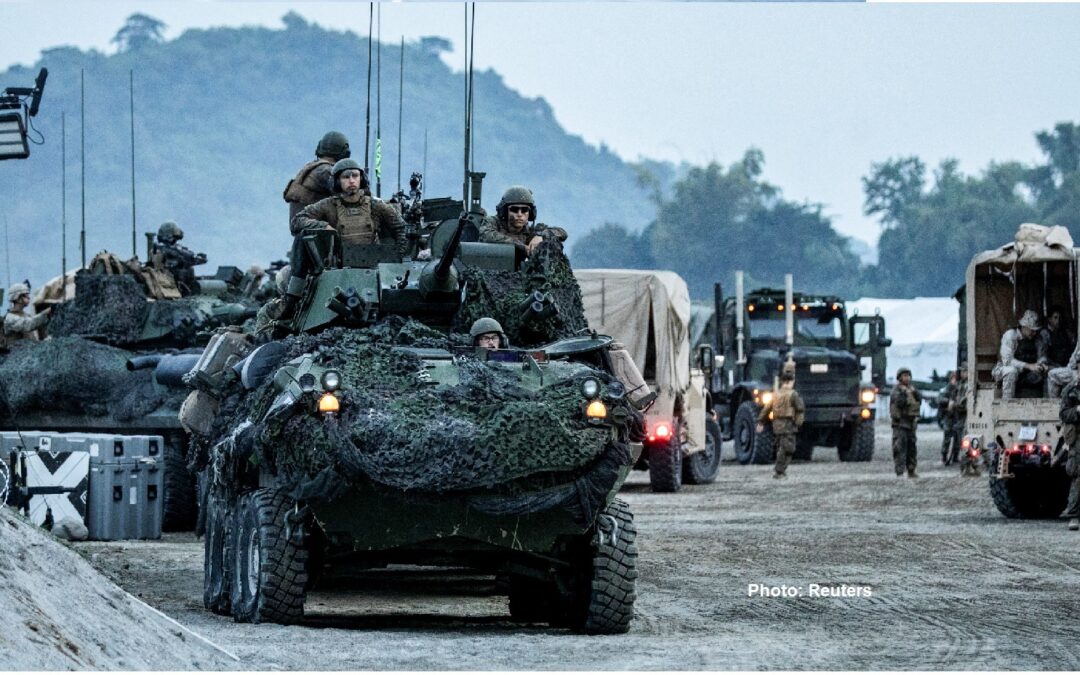By Cathy Cruz

Cathy Cruz
Filipinos are being conditioned to accept that war is imminent and that we have to take a side. From EDCA to the security deal with Australia, Japan and the US, war drums are being beaten in fever pitch.
We are being told that we cannot stay out of a possible US-China superpower conflict that may erupt in the Taiwan Strait. It does not help that President Marcos and officials such as DFA Manalo and DND Galvez have already consigned our 110 million constituents to a conflict that will only risk Filipino lives at no benefit to our people, and have become the spokesmen of the US military industrial complex.
And like how we were sacrificed in World War II, where we lost over a million souls and Manila left in ruins, we will again be this coming round only this time with greater devastation. But this war is not ours and we should not allow ourselves to be dragged onto it.
Like all wars, protagonists are selling this coming struggle and that everyone has to take a stand. They talk of shared values and rules-based order. But this war is not about ideology or principles, but naked geopolitical interests and billions of profit for the US arms industry.
US wants to maintain the top dog position in the global hierarchy, and suppresses peer competitors who do not comply with the hegemon’s dictats.
In the Philippines, those who blare the war hymns will be the ones to flee first, likely even before hostilities break out. Meanwhile, those who were led to it will suffer, like sheep being herded into slaughter.
Two arguments are being peddled to justify our involvement in this war. One is that because of our proximity to Taiwan, whatever happens to that island will adversely affect us. Secondly, because of our over 150,000 OFWs, a Taiwan emergency will directly affect the safety of our kababayans. These two arguments should be taken with a lot of salt.
First, in war, distance is a logistical issue, not a deciding factor. Whether its close or far is less important than whether it should be a target. Six Japanese aircraft carriers travelled 3,500 miles from Kuril Islands to reach Hawaii to attack Pearl Harbor, after which Japan proceeded to bomb US airfields in the Philippines and other targets in Southeast Asia. In contrast, Switzerland, sandwiched between primary actors in the European theater of World War II, notably France, Germany, and Italy, was spared. China considers Taiwan a core national interest, a redline that they are willing to go to war if need be. One may disagree with this position, but it has long been there.
What has changed is China’s capacity and political will to respond to actions she deems detrimental to her bottomline. By providing bases for the US to intervene in Taiwan, the Philippines will get herself in the crossfire. Proximity is not the issue, but rather the presence of forces considered by Beijing as hostile to her interests.
Furthermore, allowing Uncle Sam to conduct the biggest military exercises in northern Luzon, including in offshore islands close to Taiwan, amounts to provoking China. Given the record of the US military using proxy states as launching pads for its invasions in many parts of the world, statements saying US military bases in the Philippines are not directed towards any country have no credibility.
Implementing and expanding EDCA gives the US a free rein to deploy troops and preposition weapons in nine locations across the country, including sites facing the South China Sea and Taiwan. Manila’s capacity to oversee the kind of equipment that Americans are bringing and stockpiling in its shores is also in question, especially given Washington’s notorious policy of “no confirmation, no denial” on whether nuclear weapons or materials are among those flowing in.
Second, Taiwan hosts thousands of migrant workers, mainly from Southeast Asia.
Its National Immigration Agency documented 243,000 Indonesians, 240,000 Vietnamese, 153,000 Filipinos, 73,000 Thais, and 24,000 Malaysians. Filipinos are not even the most populous migrant community, yet we are the noisiest.
Have you heard Indonesia President Widodo or Vietnam President Vo Van Thuong saying they are having difficulty sleeping because of the cross-Strait issue? Long-running flashpoints should be approached soberly and astutely. Drama and emotions take a back seat. The combined 730,000 foreign residents from these five ASEAN countries are sleeping soundly in Taiwan. They have to. Work beckons the next day and everyday until their contract expires.
If we allow ourselves to be used as a US pawn, we will not be sleepwalking to doom, but doing so with eyes wide open.


